Question
PLEASE HELP ME MAKE THE CHANGES THAT MY TEACHER HAS SUGGESTED ON MY ESSAY THE INSTRUCTIONS OF THE ASSIGNMENT ARE PROVIDED SO AS THE THREE
PLEASE HELP ME MAKE THE CHANGES THAT MY TEACHER HAS SUGGESTED ON MY ESSAY THE INSTRUCTIONS OF THE ASSIGNMENT ARE PROVIDED SO AS THE THREE ARTICLES ONE IS IN PICTURE IS PROVIDED BY THE TEACHER THE QR CODES ARE THE TWO ARTICLES PROVIDED BY ME. INSTRUCTIONS: please help me fix my essay based on my teachers feed back which posed on the first picture. Please help me I am really struggling to make this essay and I really appreciate your help if need more info or anything please let me know I will be happy to answer and provide
my paragraph: Procrastination is a common habit that many individuals struggle to overcome. In her 2019 article, "Why You Procrastinate and How to Break the Habit," Charlotte Lieberman explores the idea that the root cause of procrastination lies within us, rather than external factors. Dr. Brewer argues that procrastination can only be resolved through internal means, as relying on external reasons to justify procrastination is a futile exercise. In this essay, I will argue that while internal factors are indeed significant in understanding procrastination, external factors also play a crucial role in this habit. Procrastination often stems from internal factors, such as a lack of self-discipline and time management. Our emotions and the desire for instant gratification can lead us to put off important tasks. However, external factors like a noisy environment, demanding workplaces, or even the influence of peers can exacerbate our procrastination tendencies. For instance, if a person's workplace is disorganized and chaotic, it may trigger procrastination, making it difficult to focus on tasks. This demonstrates that external elements contribute to procrastination and cannot be ignored. In some cases, external factors can act as triggers for internal issues. For instance, if someone is constantly surrounded by individuals who exhibit procrastination tendencies, they may adopt these behaviors as a way to fit in or cope with the external pressure. This means that external influences can perpetuate procrastination, making it a complex interplay of both internal and external factors. Moreover, external sources, such as the availability of addictive distractions like social media and entertainment, can exacerbate procrastination habits. These external temptations offer an escape from challenging feelings and responsibilities, supporting Dr. Brewer's assertion that we seek external reasons to soothe our emotions during procrastination. However, it is not solely a matter of blaming others or our surroundings, but rather recognizing how they interact with our internal struggles. In conclusion, procrastination is a complex issue influenced by both internal and external factors. While Dr. Brewer emphasizes the importance of addressing internal causes, it is crucial to acknowledge that external factors also contribute significantly to this habit. Procrastination is not solely a matter of self-blame but a dynamic interplay between internal emotions and external stimuli. To break the habit of procrastination, it is essential to consider both the internal and external forces that drive this behaviour. By understanding this complexity, we can better equip ourselves to overcome procrastination and lead more productive lives.
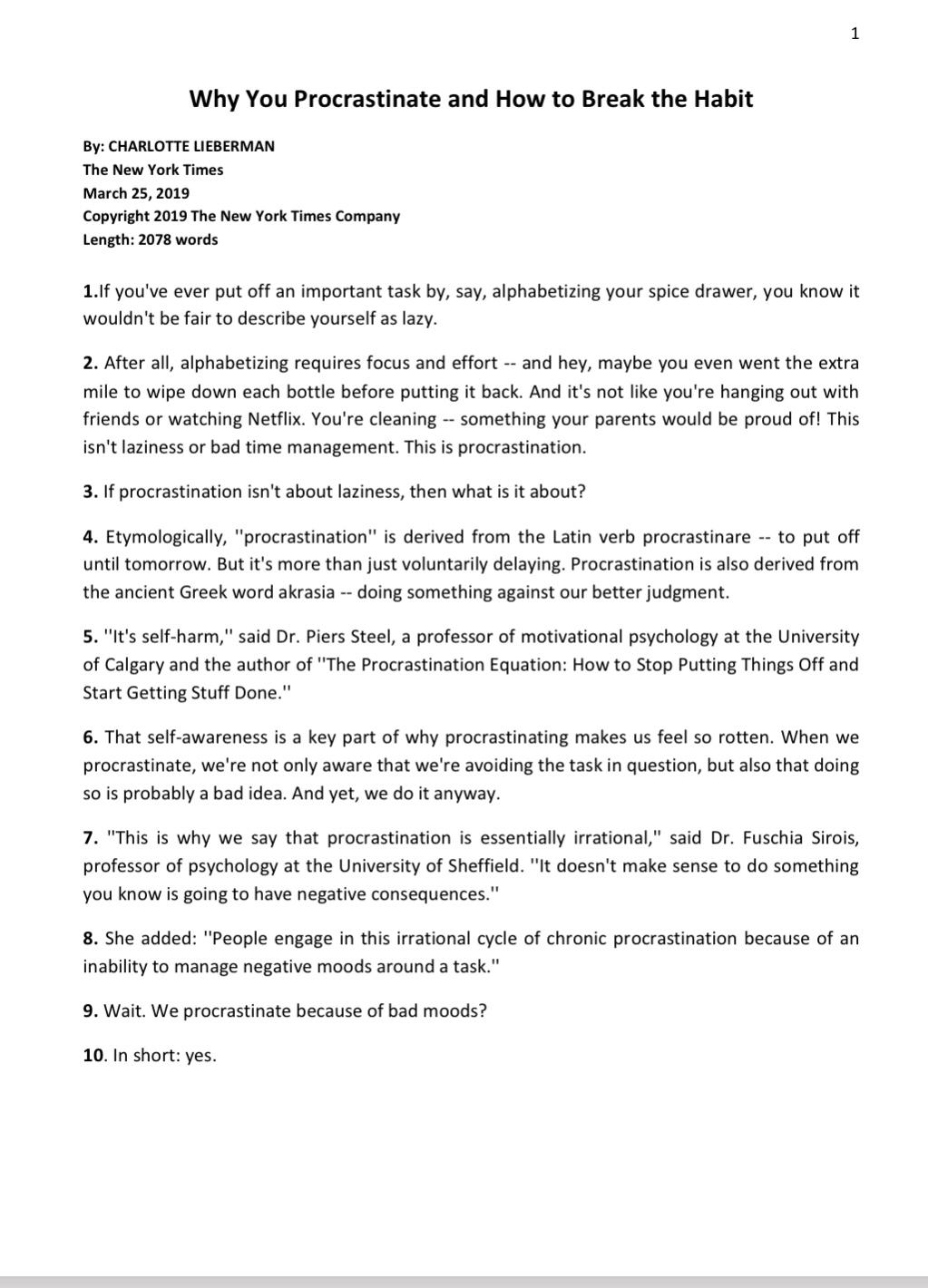
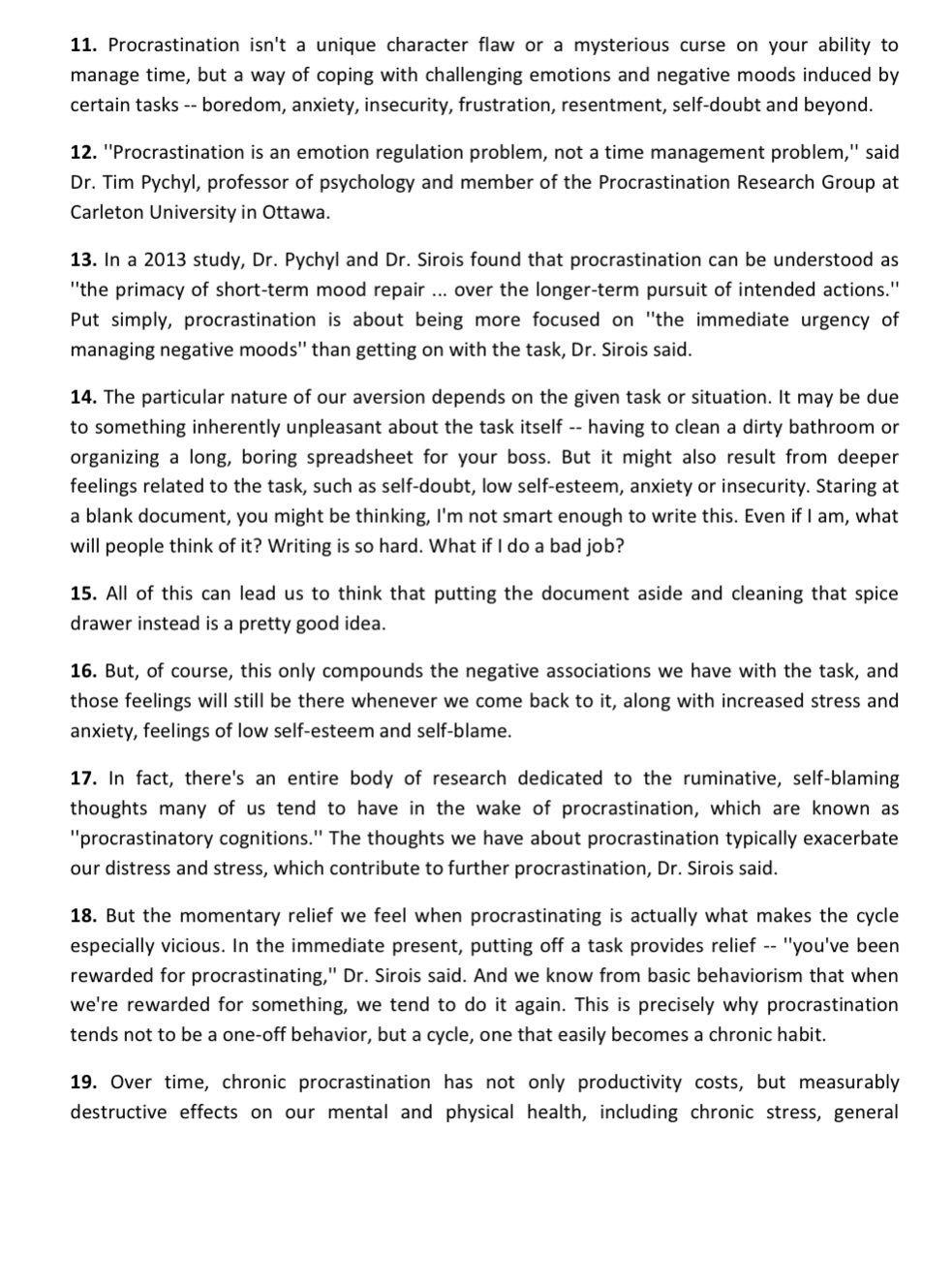
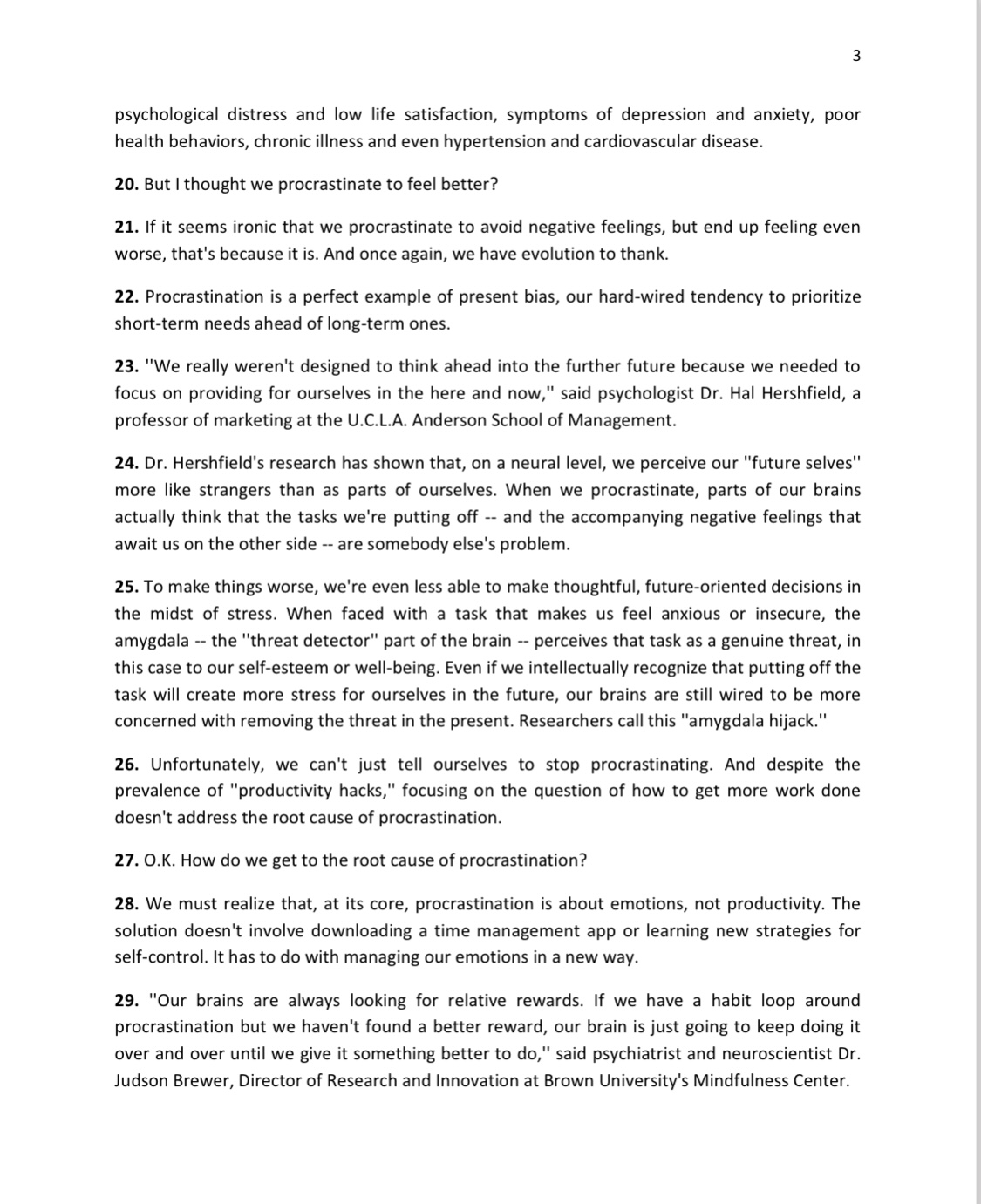
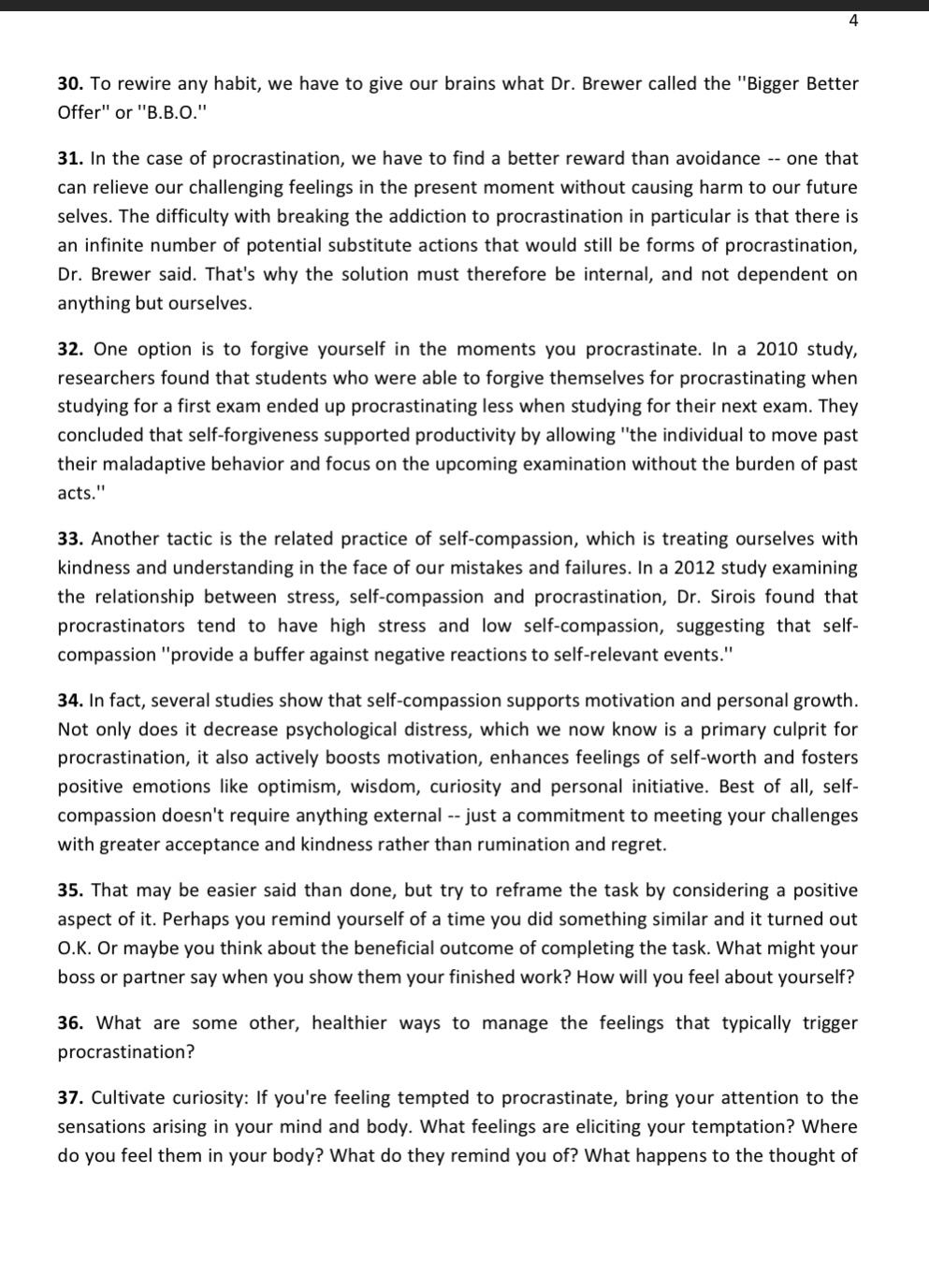
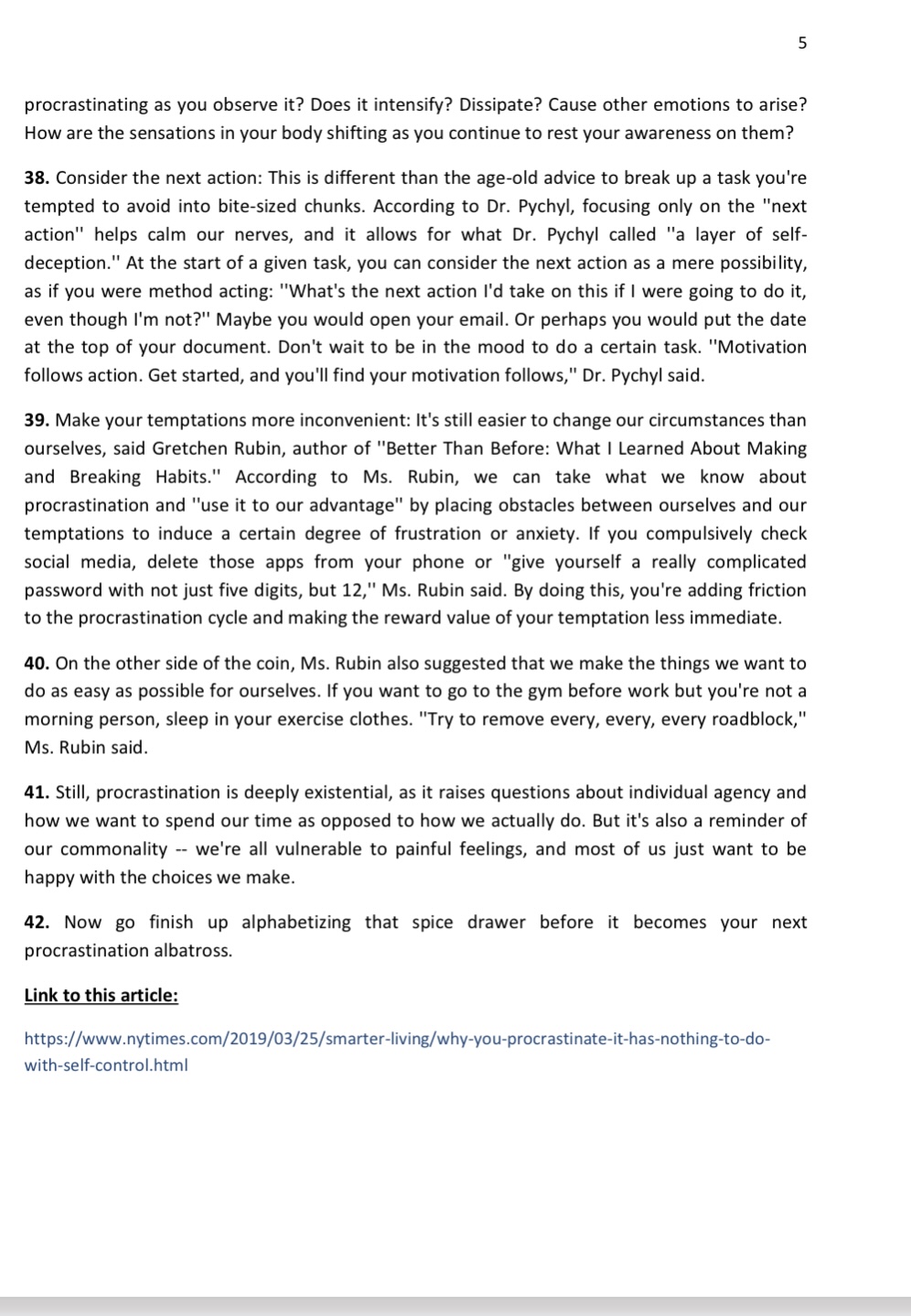


1 Why You Procrastinate and How to Break the Habit By: CHARLOTTE LIEBERMAN The New York Times March 25, 2019 Copyright 2019 The New York Times Company Length: 2078 words 1.If you've ever put off an important task by, say, alphabetizing your spice drawer, you know it wouldn't be fair to describe yourself as lazy. 2. After all, alphabetizing requires focus and effort -- and hey, maybe you even went the extra mile to wipe down each bottle before putting it back. And it's not like you're hanging out with friends or watching Netflix. You're cleaning -- something your parents would be proud of! This isn't laziness or bad time management. This is procrastination. 3. If procrastination isn't about laziness, then what is it about? 4. Etymologically, "procrastination" is derived from the Latin verb procrastinare -- to put off until tomorrow. But it's more than just voluntarily delaying. Procrastination is also derived from the ancient Greek word akrasia -- doing something against our better judgment. 5. "It's self-harm," said Dr. Piers Steel, a professor of motivational psychology at the University of Calgary and the author of "The Procrastination Equation: How to Stop Putting Things Off and Start Getting Stuff Done." 6. That self-awareness is a key part of why procrastinating makes us feel so rotten. When we procrastinate, we're not only aware that we're avoiding the task in question, but also that doing so is probably a bad idea. And yet, we do it anyway. 7. "This is why we say that procrastination is essentially irrational," said Dr. Fuschia Sirois, professor of psychology at the University of Sheffield. "It doesn't make sense to do something you know is going to have negative consequences." 8. She added: "People engage in this irrational cycle of chronic procrastination because of an inability to manage negative moods around a task." 9. Wait. We procrastinate because of bad moods? 10. In short: yes.
Step by Step Solution
There are 3 Steps involved in it
Step: 1

Get Instant Access to Expert-Tailored Solutions
See step-by-step solutions with expert insights and AI powered tools for academic success
Step: 2

Step: 3

Ace Your Homework with AI
Get the answers you need in no time with our AI-driven, step-by-step assistance
Get Started


